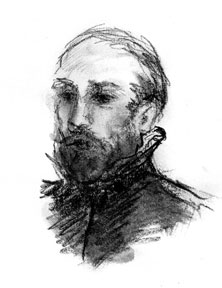
The first North American Christmas carol was written by a saint — and a member of the Society of Jesus. Now known as “The Huron Carol”, it was written by Saint John de Brébeuf, Jesuit missionary to the Huron Indians, who was martyred in 1649 by the Iroquois. Father de Brébeuf worked among the Hurons from 1626 until he was burnt at the stake after suffering heinously brutal torture. The Iroquois also attacked and destroyed the Huron mission in 1649 and 1650.
According to Jesuit Father Francis X. Heiser’s account (The Christmas Book, New York: Harcourt, Brace, and Company, 1952, pp. 82-84), Father de Brébeuf wrote the Huron language Christmas hymn, “Jesous Ahatonnia” (“Jesus is Born”), which he adapted from a sixteenth century French folk song. The Hurons who escaped the Iroquois attacks preserved the hymn. They later settled at Loretto, near Quebec, led by other missionaries. Father Étienne de Villeneuve recorded the words of the hymn, which were found among his papers following his death in 1794.
Father Heiser gave the second stanza of Father de Brébeuf’s hymn in the original Huron language. (He said that the Hurons have no M, so the missionaries substituted for it the French dipthong ou, so “Mary” appears as “Ouarie” (pronounced ‘Warie’).
Aloki ekwatatennonten shekwachiendaen
Iontonk ontatiande ndio sen tsatonnharonnion
Ouarie onnawakueton ndio sen tsatonnharonnion
Iesous ahatonnia!
Readers today may see in “The Huron Carol” an example of early missionaries’ authentic “inculturation”. In order to transmit intelligibly the full Christian truth — a truth that transcends all time and cultures — they made use not only of local language, but of an alien cultural idiom.
The English rendition of the text of the hymn as it appears here is from Selections from the Pius X Hymnal (McLaughlin & Reilly Co., Boston), except for the second stanza, which is from Father Heiser’s book.
The Huron Carol
Twas in the moon of wintertime
When all the birds had fled,
That mighty Gitchi Manitou
Sent angel choirs instead;
Before their light the stars grew dim,
And wond’ring hunters heard the hymn:
Jesus, your King is born,
Jesus is born,
In excelsis gloria.
O, harken to the angels’ word,
Do not decline
To heed the message which you heard:
The Child Divine,
As they proclaim, has come this morn
Of Mary pure. Let us adore.
Jesus is born,
In excelsis gloria.
Within a lodge of broken bark
The tender Babe was found,
A ragged robe of rabbit skin
Enwrapp’d His beauty ’round;
But as the hunter braves drew nigh,
The angel song rang loud and high:
Jesus, your King is born,
Jesus is born,
In excelsis gloria.
The earliest moon of wintertime
Is not so round and fair
As was the ring of glory on
The helpless infant there.
The chiefs from far before Him knelt
With gifts of fox and beaver pelt.
Jesus, your King is born,
Jesus is born,
In excelsis gloria.
O children of the forest free,
O sons of Manitou,
The Holy Child of earth and heav’n
Is born today for you.
Come kneel before the radiant boy;
Who brings you beauty, peace and joy.
Jesus, your King is born,
Jesus is born,
In excelsis gloria.



